Ukraine’s Deteriorating Humanitarian Crisis Discussed at National Press Club
By Phil Pasquini
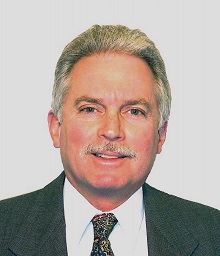
Washington: The National Press Club hosted a Newsmakers press conference March 15 on the urgent humanitarian crisis that is unfolding in Ukraine because of Russia’s invasion. Ukrainian Ambassador to the United States Oksana Markarova and Archbishop Borys Gudziak of Ukrainian Catholics in America of the Archeparchy of Philadelphia spoke on the unfolding humanitarian situation.
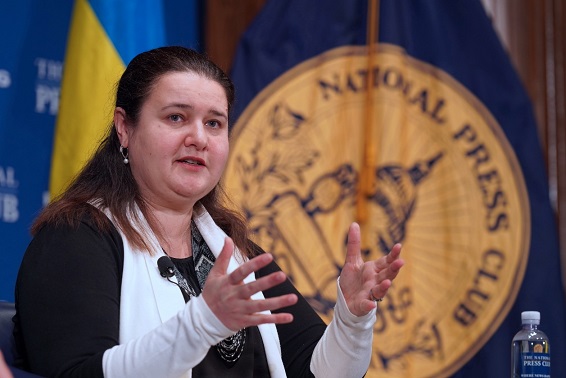
Ambassador Oksana Markarova
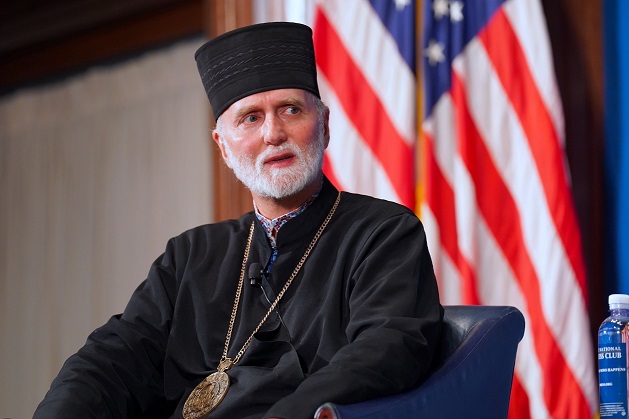
Archbishop Borys Gudziak
Ambassador Markarova began the program by thanking all journalists for covering the war and especially those on the ground in bringing the story and pictures of what is unfolding to the world’s attention. “We clearly have evidence and with the help of journalists everyone has them now that Russians are not actually targeting our armed forces,” she said. “They are targeting civilians, they are killing children, pregnant women, they kill the elderly. This is a clear case of genocide.” She went on to say that the Russians are doing this to try and force the Ukrainians into surrendering.
The ambassador reminded everyone that this genocide against the Ukrainian people really began eight years ago when Russia invaded and took possession of Crimea. “So, this is where we are right now,” she said. “For twenty days Ukraine has been defending our homes; we’re defending Ukraine, but we are also defending Europe and we’re also defending democracy and we are defending freedom…we will continue to fight for our homes and all we need from our partners is an increase, an immediate increase in military support.” She described the situation as a “humanitarian catastrophe of massive proportions.”
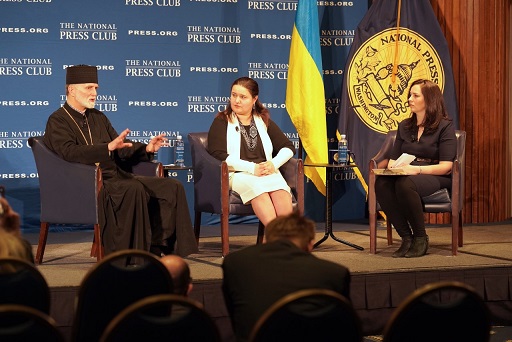
Markarova also told of people without food and water and other humanitarian supplies for the past twenty days during the invasion and called the deliberate targeting by the Russians of cultural sites, churches, synagogues, and mosques as “barbaric.” Targeted in its campaign of extermination are schools, universities and even hospitals.
Asking what Ukraine needed from all its partners and after expressing her sincere appreciation to the United States for its support, she listed three requests:
“Priority number one is we need more weapons and tools for our armed forces in order to protect our homes from Russian invaders,” Markarova stated.
Second, she pleaded for humanitarian assistance and for “all the diplomatic power that the world can put together in order to force Russians to allow the humanitarian corridor which they deny.”
And finally, she called for more sanctions to isolate Russia completely. “Russia should not sit around at the table unless they cease fire and get out from our country” She reminded everyone that in the wake of Russia’s invasion of Ukraine the post-World War II security infrastructure no longer exists.
She concluded her remarks by asking, “Is it OK for an autocratic aggressive nuclear power to attack a neighbor state and get away with it?” She opined that all the civilized world would answer “no.”
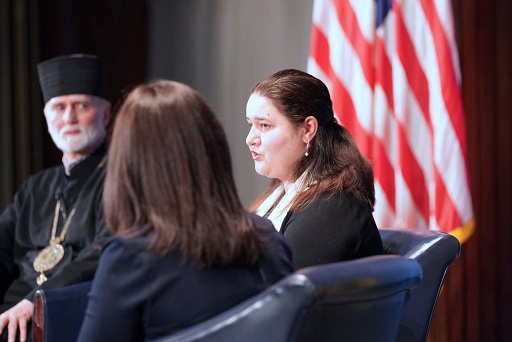
Archbishop Borys Gudziak, the top leader of Ukrainian Catholics in America, began his comments with a paraphrased quote by Joseph Stalin: “The death of one is a tragedy and the suffering of millions is a statistic.”
Speaking on Putin’s invasion of Ukraine, he said, “The world has come together, there is now a new unity and new purpose in the European union.” He likened Ukraine’s fight as biblical on the scale of David and Goliath.
Regarding religious tolerance, Gudziak observed that “Our friends in the Muslim world are coming to realize that Ukraine is home to a Muslim population that is fervently, passionately patriotic. It’s Ukrainian. In Crimea, the Muslim Tatars were deported by Stalin, welcomed back by Ukraine and they today are already for eight years persecuted under the Russian occupation.”
The archbishop stressed the importance for “people from Indonesia, from Pakistan, from the Arab countries to understand that Ukrainians are dying for the freedom of religion of Muslims who are comfortable in Ukraine. There’s a Jewish presence. Most people can’t fathom that 70 percent of Ukrainians voted for a Jewish candidate. There is great fraternal unity and love in this country, something that those who drink the Russian Kool-Aid can’t understand.” He went on to explain that it was very sad that the Russian Orthodox church stands with President Putin.
The archbishop thanked Poland for all its humanitarian support and aid to fleeing Ukrainian women, children and the elderly and went on to talk about the dire need for armored ambulances, medical supplies, food, and arms.
On the diplomatic front, he said that he met with Pope Francis five weeks ago before the war started and asked the pontiff to call Putin. The Vatican has called for peace and offered to mediate between the parties while calling for a return to negotiations, a cease-fire, and humanitarian corridors. Gudziak also reported that Pope Francis went to the Russian Embassy last month to convey his “express concern about the war” but has not publicly condemned Russian aggression against Ukraine. “I think he’s been doing everything he can behind the scenes,” Gudziak added.
“There is one reason why Ukraine has been attacked – because it is a democracy and it has the disease of freedom of the press, freedom of religion, elections and a vital civic society,” he stated. “All of this is a dangerous virus for hypocrisy, for oligarchic kleptocracy and for what Putin stands for.”
During the question-and-answer session, Ambassador Markarova poignantly reminded everyone that “We will do everything possible to help our country to win this war, to bring Russia to justice, to bring peace to Ukraine, but peace that will end in victory. Ukrainians will never surrender.”
Her message to the United States and all Ukraine’s friends and allies is that we need to understand that “We are living now in a 1939 moment. It’s not enough just to help Ukraine to fight this on our territory. We have to do it together because Putin repeatedly said, and all of his leaders around him and everything that we hear from Russia is, that they will not stop with Ukraine. We have to act faster; we have to unite, and we have to give a decisive response while it is still local because people in 1939 failed to do so and we cannot afford to do it this time.”
(Phil Pasquini is a freelance journalist and photographer. His reports and photographs appear in the Washington Report on Middle East Affairs and Nuze.ink. He is the author of Domes, Arches and Minarets: A History of Islamic-Inspired Buildings in America.)
-----------------------------------------------------------------------------
Back to Pakistanlink Homepage

